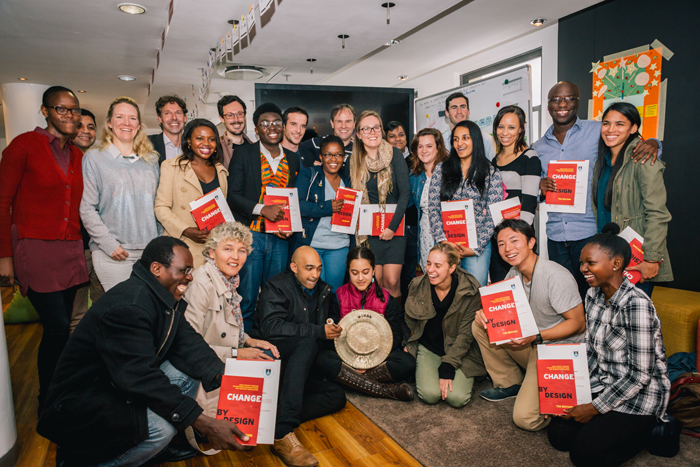Design thinking gets thumbs up
30 May 2016 | Story Andrea Weiss. Photo Supplied.
A cohort of 27 postgraduate students at UCT has just completed the first ten-week programme at UCT's new Hasso Plattner Institute of Design Thinking – and participants have come away inspired by this innovative way of tackling real-world problems.
Nomfundo Sibiya is doing her PhD in medical microbiology. It's the kind of high-end focus that can be isolating, and so Sibiya decided to broaden her horizons by signing up for an intensive programme with UCT's new Institute of Design Thinking – or d.school, as it's known.
Being a scientist, it was her first experience of working in a multidisciplinary group on a problem completely unrelated to her field. Her group called themselves the d.humans, and they looked at how to engage with banking customers in the 21st century.
“It was more than I expected because it taught me to think outside the box,” says Sibiya. “My whole background is science and scientific research, and I found myself working with people in the arts, engineering and information systems. I would definitely recommend it to others.”
The UCT chapter of the d.school is the third Hasso Plattner Institute of Design Thinking in the world. It joins other established d.schools at Stanford and Potsdam universities and is currently based at UCT's Graduate School of Business (GSB) campus under the directorship of Richard Perez.
Design thinking's basic tenets are collaboration, human-centredness, creative thinking and learning through doing – and it's regarded as both a career and entrepreneurial competency. Students who sign up work in interdisciplinary teams, mentored by coaches, in a customised studio space.
The students were divided into five groups who, after learning the tools, techniques and process of design thinking, were set to work on problems posed by three project partners. The partners for this pilot were Standard Bank, the City of Cape Town and a startup car-sharing scheme called Rent My Ride.
Learning through doing
At the graduation ceremony for the first group, Perez said: “I hope we haven't muddled your brains too much in the last ten weeks. Thanks for the time and the commitment.”
He added: “The groups presented to the project partners, who were quite blown away by the insights and ideas the students came up with. For us this was our first pilot – and the students were in some way our guinea pigs.
“We tried to limit the project partners' involvement and so the ideas that came out were very original, having gone through the process of design thinking where the students were really engaged and spoke to people [who are potential users].”
Armand Bam, a PhD business administration student, reiterated that the programme required commitment – he participated in a group called Trains on Time. Their brief, derived from the City of Cape Town, was to look at how to invigorate Plumstead as a transport hub. They came up with the idea of a PlumTree social network that would breathe life into the area.
Bam said: “I really enjoyed the prototyping stage where we got involved in crazy solutions whether they would work or not. It really challenges students in an academic environment to think creatively and at the same time be critical about what it is they're trying to solve. But you need time. It takes a lot of headspace.”
Out of your comfort zone
Philemon Arito, a PhD civil engineering student from Kenya, also found himself operating out of his comfort zone. His group also looked at the issue of the Plumstead hub and came up with a completely different design solution for the area.
“I had to learn how to work in a multidisciplinary team and also it came with the challenge of managing time between my PhD and the programme. But the experience will really help me a lot, even after I've completed my degree, especially as I am interested in research-based entrepreneurship.”
His thoughts were echoed by Stefan Louw, who is doing his MPhil in energy and development studies: “I would definitely recommend it. It's hard to tangibly say what you learned, but a mindshift definitely happens, which you only really see upon reflection.” His team, called Cultivate, looked at 21st-century banking and how banks could support start-up entrepreneurs.
Luet Buys, a master's in architecture student, said that she found the programme really inspiring: “If nothing else, the people I've met here will be a valuable network going forward. I was already working in a design field, so the concepts weren't new to me, but the application was definitely very new and rewarding.”
She said it was heartening to see how her group – who called themselves Pineapple – had come up with ideas that the client, in this instance Rent My Ride, had already started to implement on their website.
Key attributes
Deputy Vice-Chancellor Professor Francis Petersen, who attended the closing ceremony for family and friends, said the institute was focusing on areas highly valued by UCT, among them interdisciplinary work, innovation and continuous learning and action.
“I hope you have enjoyed the ride and through the experience will take with you some of the key things that we would like to build and see at UCT in the future.”
The next programme will probably run over 12 weeks. Although participation is free, prospective students have to commit to two full days a week and the course is intensive.
Ultimately, the school also aims to offer short courses for businesses.
Enquiries can be directed to Lorelle Bell or dschool@uct.ac.za.
 This work is licensed under a Creative Commons Attribution-NoDerivatives 4.0 International License.
This work is licensed under a Creative Commons Attribution-NoDerivatives 4.0 International License.
Please view the republishing articles page for more information.










